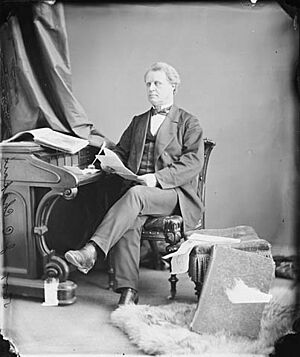Jean-Charles Chapais facts for kids
Quick facts for kids
The Hon.
Jean-Charles Chapais
|
|
|---|---|

Jean-Charles Chapais as Receiver-General, in 1870
|
|
| Senator for De la Durantaye, Quebec | |
| In office January 30, 1868 – July 17, 1885 |
|
| Appointed by | John A. Macdonald |
| Preceded by | Joseph-Noël Bossé |
| Succeeded by | John Jones Ross |
| Member of the Legislative Assembly of Quebec for Champlain | |
| In office 1867–1871 |
|
| Preceded by | John Jones Ross |
| Succeeded by | François-Xavier-Anselme Trudel |
| Personal details | |
| Born | December 2, 1811 Rivière-Ouelle, Lower Canada |
| Died | July 17, 1885 (aged 73) Ottawa, Ontario |
| Political party | Conservative |
| Other political affiliations |
Conservative Party of Quebec (historical) |
| Children | Thomas Chapais |
| Cabinet | Minister of Agriculture (1867-1869) Receiver General (1869-1873) |
Jean-Charles Chapais (born December 2, 1811 – died July 17, 1885) was an important Canadian politician. He was a member of the Conservative Party. People remember him as one of the "Fathers of Confederation". This means he helped create Canada as a country. He took part in the Quebec Conference, which was a big meeting to decide how Canada's government would work.
Chapais was born in a small town called Rivière-Ouelle in Quebec. He went to school in Nicolet. He was successful as a farmer and a merchant. In 1845, he became the first mayor of Saint-Denis-de-la-Bouteillerie. He had lived there since 1833. The next year, he married Georgina Dionne, and they had six children together.
Political Career
Jean-Charles Chapais started his political journey because his father-in-law encouraged him. In 1851, he was first elected to the Legislative Assembly of the Province of Canada. This was like a parliament for the area that would later become Canada. He served five terms representing the area of Kamouraska.
Chapais was part of a political group called the ""bleus"". He supported other important leaders like Augustin-Norbert Morin and George-Étienne Cartier. He worked to end the old system of seigneurial tenure in Quebec. This was a land ownership system from the past. He also helped make new laws to improve farming.
Helping Create Canada
After a meeting called the Charlottetown Conference in 1864, Chapais went to the Quebec Conference. At this meeting, he spoke for Canada East (which is now Quebec). He wanted to make sure that the new provincial governments would have strong powers in the Canadian system.
Chapais was in charge of Public Works from 1864 to 1867. This was during a time when different political groups worked together in something called the "Great Coalition". He helped build the Intercolonial Railway and made the Grand Trunk Railway bigger. These railways were very important for connecting different parts of the new country.
In 1867, the British North America Act was passed. This law officially created the country we know as the Dominion of Canada. Chapais became Canada's first Minister of Agriculture. Around this time, he also started representing Champlain in the Quebec legislature. On January 30, 1868, Jean-Charles Chapais became a member of the Senate of Canada. He stayed in the Senate until he passed away.
Later Roles
As Minister of Agriculture, Chapais had many responsibilities, not just farming. His department also handled animal imports and exports, immigration, the census (counting people), patents (new inventions), trademarks, public health, manufacturing, and even the arts.
After less than three years, he was replaced as Minister of Agriculture. His new job was Receiver General for Canada. This role mainly involved managing payments for the government. Today, this job is part of the Minister of Public Works. Chapais resigned in 1873. He said he wanted to spend more time with his family and his businesses. He is buried in Saint-Denis-De La Bouteillerie, Quebec.
Chapais's house in Saint-Denis-De La Bouteillerie was recognized as a National Historic Site of Canada in 1962. This means it's an important place in Canadian history.
| Political offices | ||
|---|---|---|
| Preceded by Edward Kenny |
Receiver General 1869-11-16 – 1873-01-29 |
Succeeded by Théodore Robitaille |
 | Jackie Robinson |
 | Jack Johnson |
 | Althea Gibson |
 | Arthur Ashe |
 | Muhammad Ali |

